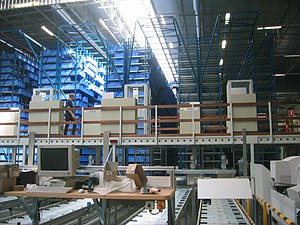
Image via Wikipedia
A new entry into the world of supply chain logistics began in the 1990s as companies began to subcontract supply chain logistics functions to third party companies.
Being able to eliminate the function of distributing products to customers meant companies would be able to eliminate the expense of paying for warehouse rental for those who did not have a warehouse of their own.
For those with their own warehouses outsourcing their supply chain logistics functions allowed them to not only eliminate the expense of operating the warehouse but also the expense of paying staff to operate it and the shipping department as well.
One of the problems that faced many companies when it came to supply chain logistics was employee turnover. Because many companies chose to pay warehouse employees barely above the minimum wage for the manual work they performed, many experienced a huge turnover. This also caused many companies to also resort to hiring temporary help to work in the warehouse; they also began to start looking toward hiring warehouse workers for shifts no one else wanted to work. Because they worked for contractors, it was an easy task to replace those supply chain logistics employees with someone else.
Fortunately for companies a better solution entered the market: fulfillment companies. This opened the way for many small companies and retail chains to eliminate the cost of renting offsite warehouses for storage. By contracting for a specific fee, third party supply chain logistics companies such as UPS Supply Chain Solutions took over all of supply chain logistics functions including storage and delivery of products to the customers. In some cases they could even arrange to have the logistics company pick up newly produced goods that were not yet ready for delivery to the customers.
Supply chain logistics is not a function only small companies began to outsource; many retail chains began to use it as a way to store overstock they received from central warehouses instead of cluttering their very limited space. It was also a way to maintain more control over how much stock they had easily accessible instead of having to reorder from other locations and hope the products arrived on time. Outsourcing supply chain logistics functions is not just a way for small companies to save money, but it is also a way for all companies to eliminate some of the hassle of maintaining a staff of logistics employees.

